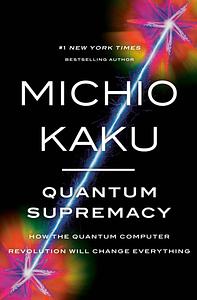You need to sign in or sign up before continuing.
Take a photo of a barcode or cover
73 reviews for:
Quantum Supremacy: How the Quantum Computer Revolution Will Change Everything
Michio Kaku
73 reviews for:
Quantum Supremacy: How the Quantum Computer Revolution Will Change Everything
Michio Kaku
informative
medium-paced
this book was informative. and speculative. and minimized the war crimes of Fritz Haber. and celebrated fascist nazi collaborator Henry Ford. and celebrated Thomas Edison as an innovator instead of a cutthroat lying thief. Oh yeah Bill Gates, Elon Musk and Jeff Bezos get a lot of thumbs up too.
it's outrageous to me that someone can be as smart as Michio Kaku but still dumb enough to speak of capitalist structures, profit incentives, etc as immutable laws of nature when discussing the ramifications of quantum computing. also frustrating to listen to ramblings on artificial intelligence from someone still anthropomorphizing these tools.
overall, this would have been better as a 20-30 minute primer. the whole book was just this dude repeating the same formula about wild speculation of what could happen. then defending capitalism in the face of climate change and global hunger.
god i wish i had abandoned this one early.
it's outrageous to me that someone can be as smart as Michio Kaku but still dumb enough to speak of capitalist structures, profit incentives, etc as immutable laws of nature when discussing the ramifications of quantum computing. also frustrating to listen to ramblings on artificial intelligence from someone still anthropomorphizing these tools.
overall, this would have been better as a 20-30 minute primer. the whole book was just this dude repeating the same formula about wild speculation of what could happen. then defending capitalism in the face of climate change and global hunger.
god i wish i had abandoned this one early.
Idk I’m starting to get irritated reading about artificial intelligence bc humans haven’t weeded out natural stupidity yet
hopeful
informative
medium-paced
informative
fast-paced
hopeful
informative
medium-paced
informative
fast-paced
challenging
hopeful
informative
Most of the book follows this pattern:
1. Is there an interesting approach or concept in science, medicine, engineering, or computer science?
2. Could it conceivably benefit from massively increased processing power, particularly in making simulations?
3. Quantum computing could make this work.
Further, in the few cases where I actually had some knowledge relevant to the field in question, I found that the author's explanations tended to oversimplify - I won't say "get wrong", because these fields can move fast, I'm not a full expert in any of them, and I haven't written a book - these concepts to the point where I could tell that if I were reading these without that knowledge, I would have formed some potentially significant misconceptions.
This filled me with doubt that the portions concerning fields where I did not have significant prior knowledge were actually giving me a reasonably complete and accurate impression of the details of those fields. And given that steps (2) and (3) above tend to repeat themselves quite a lot, learning about the new approaches in step (1) was, by the early middle of the book, the only interesting part. So when I began to doubt, and on continuing to read reinforced my doubt, that the information I was getting in step (1) was actually good, there was nothing left to read for.
1. Is there an interesting approach or concept in science, medicine, engineering, or computer science?
2. Could it conceivably benefit from massively increased processing power, particularly in making simulations?
3. Quantum computing could make this work.
Further, in the few cases where I actually had some knowledge relevant to the field in question, I found that the author's explanations tended to oversimplify - I won't say "get wrong", because these fields can move fast, I'm not a full expert in any of them, and I haven't written a book - these concepts to the point where I could tell that if I were reading these without that knowledge, I would have formed some potentially significant misconceptions.
This filled me with doubt that the portions concerning fields where I did not have significant prior knowledge were actually giving me a reasonably complete and accurate impression of the details of those fields. And given that steps (2) and (3) above tend to repeat themselves quite a lot, learning about the new approaches in step (1) was, by the early middle of the book, the only interesting part. So when I began to doubt, and on continuing to read reinforced my doubt, that the information I was getting in step (1) was actually good, there was nothing left to read for.
informative
inspiring
fast-paced




